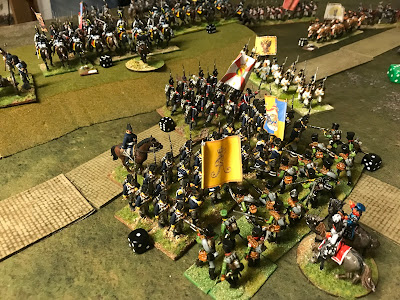For a break from the 1813/14 historical battles we've been doing recently we played a scenario from CS Grant's scenario book this week. I picked Significant Terrain, which involved both sides trying to capture and hold a key road junction. Back to two tables this week, with me playing the Russians on table 2.
Table 1 - Germans vs Prussians /Austrians
In this game the two sides had opposing plans; the Germans went for an infantry centre with horse on the flanks. The allies went with a centre of horse and the infantry attacking up the flanks using the houses as cover.
 |
| German cavalry advance |
 |
| The Allied cavalry scatter the Germans attacking the centre |
 |
| Cavalry slug it out |
With both sides cavalry scattered, the infantry columns got stuck-in with a second phase of close quarters fighting around the road junction.
It was very much last-man-standing with the Austrians in control of the junction when the smoked cleared and no Germans able to mount a further attack.
 |
| The last unit standing in the centre |
So an Allied Victory - in this case the clever use of the houses to funnel the action into the centre helped the Allies as it made it hard for the Germans to outflank them and so exploit their wider deployment.
Table 2 - French vs Prussians / Russians
The French pushed forward in the centre with their horse and an infantry brigade plus the divisional reserves on the west side of the board. The Allies pushed the heavy horse up the middle backed by the Prussian foot, with the Light horse heading east. The Russians deployed 2 battalions against the French flanking force and used the rest to support the Prussians.
 |
| The French take the hill |
The French horse on the hill were in a no-lose position if charged as even if they failed the counter-charge role they would be defending the hill and so negate the Allies charge. So initially the Allies held off while they moved their infantry and guns into position to hold the road junction.
 |
| French deploy to meet a flanking threat |
 |
| The French western flank attack |











No comments:
Post a Comment